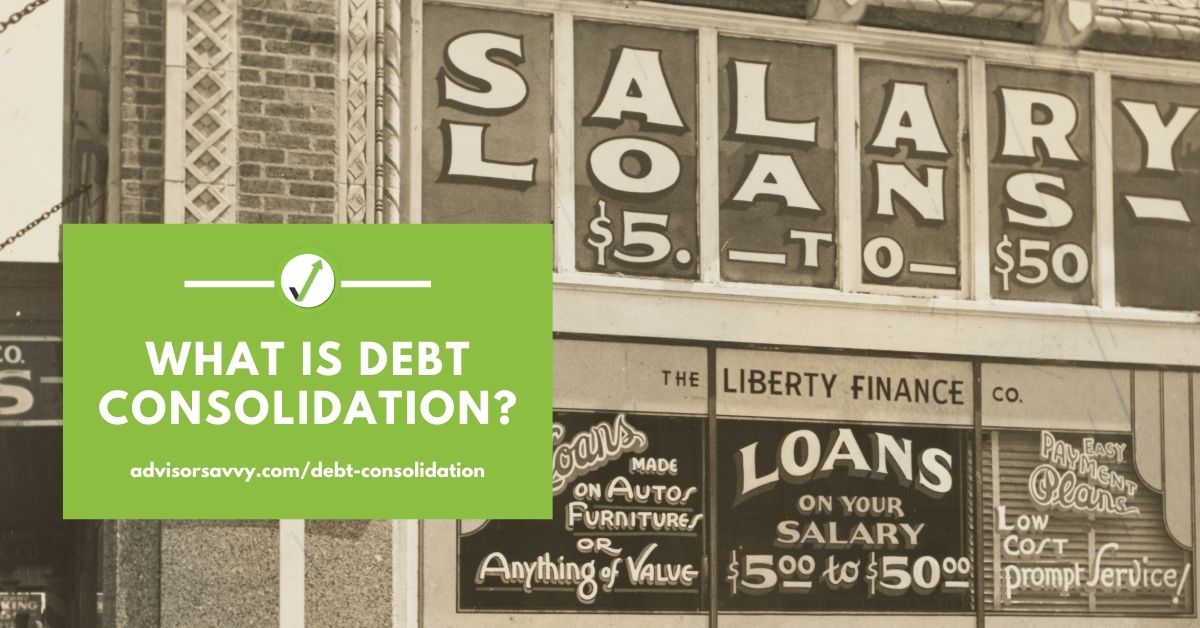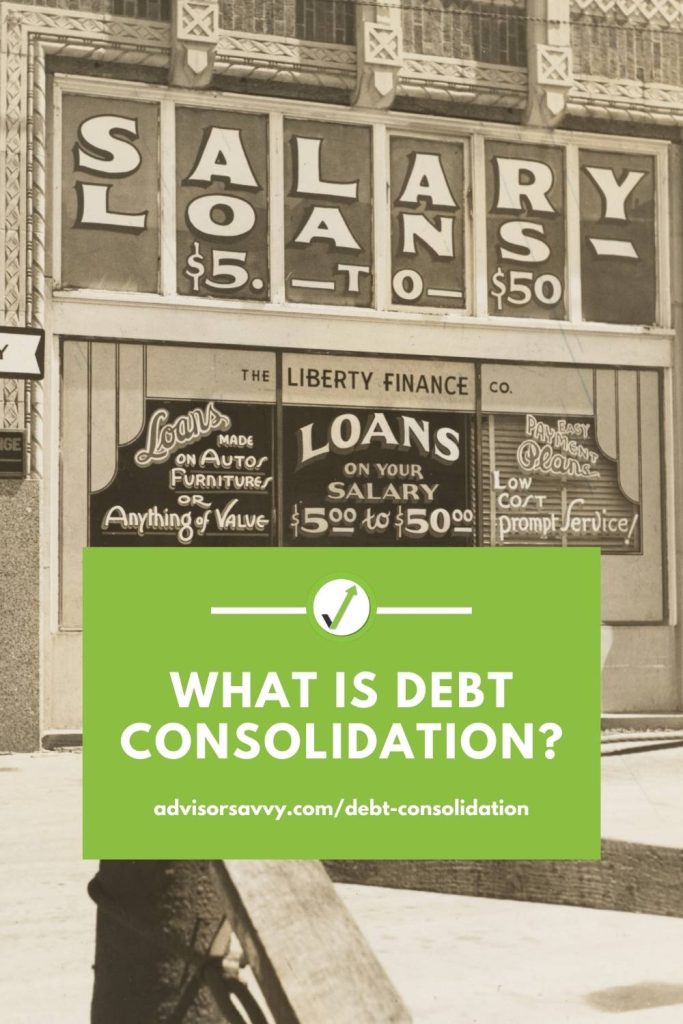
Canadians carry a lot of debt. We have access to a lot of credit, and we use it. In fact, a 2022 Equifax Canada report found that Canadian consumers owe $2.2 trillion, with the average person’s debt sitting at just over $20,000. Even more, 47% of respondents from Bromwich + Smith’s 2022 The Perfect Storm Survey, said that managing debt was a significant worry. Are you dealing with debilitating interest payments on your debt? Debt consolidation might be an option for you to get your head back above water.

Table of contents
- What is debt consolidation?
- How does debt consolidation work?
- When you should consider debt consolidation
- Is debt consolidation a good idea?
- How does debt consolidation affect a credit score?
- Who can qualify for a consolidation loan?
- How to consolidate your debt
- What is the best way to consolidate your debt?
What is debt consolidation?
Put in the most basic terms, debt consolidation is a large, low-interest loan that is used to pay off smaller debts. Smaller debts usually come with higher interest rates.
The idea is to have one payment, instead of many, with a lower rate. Ultimately, it’s much easier to manage and pay off the accrued debts in one go.
How does debt consolidation work?
A lender reviews your credit and determines if you are eligible for a loan, as well as how much you are entitled to receive. The lender then either pays off your debts on your behalf or gives you the cash to pay it off yourself. The scenario depends on the type of debt being paid, and the lender.
When the debt is paid off, the lender asks for the account to be closed so it can no longer be used. The borrower pays the lender on a monthly basis until the debt is repaid in full.
Related Reading: The Best Financial Planning and Retirement Calculators
When you should consider debt consolidation
Debt consolidation isn’t a tool for managing debt on a regular basis. Its purpose is to help someone with decent credit take advantage of the opportunity to lower their interest-rate payments. It also reduces the number of monthly bills into one payment.
Who should consider debt consolidation? If you have multiple debts with high-interest costs and if you are not paying them off in full every month.
Debt consolidation loans have a deadline outlining when the debt needs to be paid off. This means that rather than continuing to pay into what feels like a never-ending black hole of debt, there is a light at the end of the tunnel.
Is debt consolidation a good idea?
Advantages of debt consolidation
- One payment — Those of us who rack up debt on multiple cards or lines of credit can feel the burden of high payments and multiple due dates. In addition, the high interest rates on credit cards can feel downright insurmountable. One payment to one institution is convenient and easy.
- Lower interest — Even if you have low-interest loans, credit debt still tends to carry a higher interest rate than what you can get through a consolidation loan. If you struggle to make monthly payments on your debts, (which is why you’re getting this loan in the first place) you are throwing good money on multiple cards with higher rates.
- Lower monthly payments — Your minimum payments across all debt can definitely add up. One of the great benefits of a consolidation loan is a lower monthly payment than you would otherwise pay on individual debts alone.
- Happy creditors — With a consolidation loan, you pay your creditors in full. Your credit takes a serious hit when you aren’t paying off your debt in due course. This makes debt consolidation a great way to maintain, or get back to, a healthy credit score.
Risks of debt consolidation
While debt consolidation is a great tool, it can be risky. If you’re the type of person who looks at it as just one loan to pay, be careful you aren’t continuing to add to the debt you created in the first place.
Typically, consolidation is for anyone who feels like they are in over their heads. Or, perhaps you want to get control of the feeling that you just juggle multiple debts. But, unless you enlist the help of an expert who can effectively counsel you, old habits will result in a second such loan in short order.
You also need a decent credit score to get the loan. If your credit rating isn’t strong, you will likely have to provide collateral or have a co-signer on the loan in order to be approved. Having credit isn’t a good enough reason for a bank to approve you for a loan.
How does debt consolidation affect a credit score?
One of the greatest benefits of a consolidation loan is that it doesn’t negatively affect your credit score. Instead, your credit score may actually improve.
Now that you are not responsible for paying multiple debts at once, you are far less likely to miss payments, which can hurt your credit score. A single, manageable payment versus multiple, larger payments is simply easier for most people to manage. This makes debt consolidation a great way to stop the bleed, and hopefully, improve your credit score.
Who can qualify for a consolidation loan?
It’s certainly not a given that if you are approved for a credit card you’ll be approved for a sizeable loan.
You’ll need to tick off five factors for a consolidation loan. You need:
- A good credit score
- Collateral
- Manageable debt
- Limited credit history
- Income to pay off the loan
How to consolidate your debt
There are different ways of consolidating debt in Canada. If you decide to take this route, here are the potential ways you can secure the loan you need.
Debt consolidation loan
A debt consolidation loan is one of the easiest and best ways to consolidate your debt. It means one payment, once a month, to pay off all of the individual credit balances you carry.
Try this Loan Calculator
Home equity loan/refinance mortgage/second mortgage
Taking on multiple mortgages is one way many people choose to consolidate their debt. The idea is to use your house as collateral.
You take equity from the property to pay off the credit debt and roll it over into your mortgage payments. Debt consolidation mortgages typically have lower interest rates than those on credit cards.
Line of credit or overdraft
A line of credit is like having money added into your bank account that you can use for whatever you want. However, you pay interest on the amount of money you withdraw. You also pay back a minimum of the withdrawal on a monthly basis. The account is there for as long as you want to draw from it.
The major downside is its ease and availability — not ideal if you struggle with money management. Because a line of credit is largely self-directed, it’s all about self-control. While it looks like your money, it’s actually debt. So, make sure you don’t use it to grow your debt rather than reduce it.
Credit card debt consolidation
You can consolidate credit debt by using the available credit on one of your credit cards (with a low-interest rate) to pay off your other cards. Then, you just have one payment on one credit card, charging one interest rate.
Debt consolidation services
Debt consolidation services are run by credit counsellors. Counsellors take a monthly payment from you and disperse that payment to your creditors. In order to qualify for this program, your creditors must agree to allow the agents to pay on your behalf. These relationships typically last three to five years, which is about how long it takes to pay off credit debt.
File a consumer proposal
A consumer proposal is one of the last steps to consider when attempting to avoid bankruptcy. At this point, your finances are likely out of control.
A Licensed Insolvency Trustee will reach out to your creditors. The trustee will say something along the lines of, “Mr. Smith is currently carrying a $14,000 debt with you that he will never be able to reasonably pay off. He would like to avoid claiming bankruptcy, where you will get less if any of the money he owes you. If he can pay you $X, would you be willing to consider the debt paid off?”
This is a simplified version of what happens. But ostensibly, your creditors will take something over nothing (if the proposal is reasonable). The amount is determined by your income and assets, and costs about $1,500 to file. This is a legal process and it will affect your credit score.
Consolidation loan vs. consumer proposal
As Bromwich + Smith explains, a consumer proposal will consolidate your debts into a monthly payment, compared to a consolidation loan where you pay back what you can afford — not what creditors are calling for. There are no interest charges under a consumer proposal, and you do not need a good credit rating.
Consumer proposals will stop creditor action. If you’re getting endless phone calls, these will end.
Working with Bromwich + Smith, Advisorsavvy has a team of Licensed Insolvency Trustees in our roster of financial professionals, ready to help!
What is the best way to consolidate your debt?
Things to consider:
- Your long- and short-term credit needs
- Whether you can manage your current debt load
- How much money you can afford to pay back on a monthly basis
- Your credit score and the ability to qualify for various loan options
Whichever method you choose, getting your debt under control and making a serious effort to reduce it is the best possible way to get yourself back above water without having to file for bankruptcy.
Your financial situation is unique, and we can help you find the best advisor or Licensed Insolvency Trustee for your needs. Just fill out our short questionnaire.
